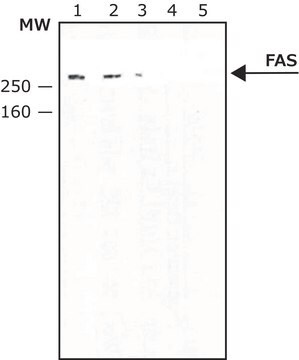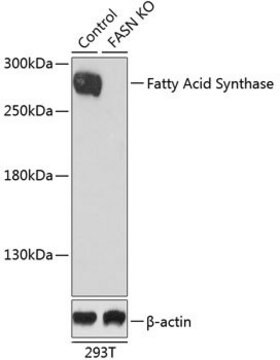一般說明
We are committed to bringing you greener alternative products, which adhere to one or more of The 12 Principles of Green Chemistry.This antibody is Preservative-free, produced without the harm or sacrifice of animals and exceptionally stable to allow for ambient shipping and storage if needed and thus aligns with "Waste Prevention", "Designing Safer Chemicals" and "Design for Energy Efficiency".
Click here for more information.
ZooMAb® antibodies represent an entirely new generation of recombinant monoclonal antibodies.
Each ZooMAb® antibody is manufactured using our proprietary recombinant expression system, purified to homogeneity, and precisely dispensed to produce robust and highly reproducible lot-to-lot consistency. Only top-performing clones are released for use by researchers. Each antibody is validated for high specificity and affinity across multiple applications, including its most commonly used application. ZooMAb® antibodies are reliably available and ready to ship when you need them.
特異性
Clone 2C13 is a ZooMAb® Rabbit recombinant monoclonal antibody that specifically detects Fatty Acid Synthase. It targets an epitope within 24 amino acids from the N-terminal region.
免疫原
KLH-conjugated linear peptide corresponding to 24 amino acids from the N-terminal region of human Fatty Acid Synthase.
應用
Quality Control Testing
Evaluated by Western Blotting in HEK293 cell lysate.
Western Blotting Analysis: A 1:1,000 dilution of this antibody detected Fatty Acid Synthase (FASN) in HEK293 cell lysate.
Tested applications
Western Blotting Analysis: A 1:1,000 dilution from a representative lot detected FASN in lysates from mouse brain tissue HeLa, and L6 cells.
Immunocytochemistry Analysis: A 1:100 dilution from a representative lot detected FASN in A549 cells.
Immunohistochemistry (Paraffin) Analysis: A 1:100 dilution from a representative lot detected FASN in human breast tissue sections.
Affinity Binding Assay: A representative lot of this antibody bound Fatty Acid Synthase with a KD of 8.7 x 10-7 in an affinity binding assay.
Note: Actual optimal working dilutions must be determined by end user as specimens, and experimental conditions may vary with the end user
標靶描述
Fatty acid synthase (UniProt: P49327; EC:2.3.1.85, Type I fatty acid synthase, FASN) is encoded by the FASN (also known as FAS) gene (Gene ID: 2194) in human. FASN is a ubiquitous enzyme that displays prominent expression in brain, lung, liver, and mammary glands. It is a multifunctional complex enzyme that catalyzes de novo synthesis of long-chain saturated fatty acids starting from acetyl-CoA and malonyl-CoA in the presence of NADPH. This entire reaction is composed of numerous sequential reactions and acyl intermediates, each catalyzed by a specific enzyme activity. FASN is present as a homodimer arranged in a head to tail fashion. It contains seven catalytic activities and a site for the binding of the prosthetic group 4′-phosphopantetheine of the acyl carrier protein (ACP) domain. Its unique carboxyl terminal thioesterase domain(aa 2207-2511) hydrolyzes the growing fatty acid chain and plays a critical role in regulating the chain length of fatty acid released. FASN is activated by nitrosylation at cysteine 1471 or Cysteine 2091. In adipocytes S-nitrosylation is shown to occur under physiological conditions and gradually increases during adipogenesis. In addition to its role in fatty acid synthesis, it also plays an important role during embryonic development. Although in all nonmalignant adult tissues FASN expression is low, it is significantly up-regulated in many cancer types. Cerulenin, a potent non-competitive pharmacological inhibitor of FASN, binds covalently to the active site of the condensing enzyme region and inactivates a key enzyme step in fatty acid synthesis. This ZooMAb® recombinant monoclonal antibody, generated by our propriety technology, offers significantly enhanced specificity, affinity, reproducibility, and stability over conventional monoclonals. (Ref.: Chakravarty, B., et al. (2004). Proc.Natl. Acad. Sci. USA. 101(44); 15567-15572).
外觀
Purified recombinant rabbit monoclonal antibody IgG, lyophilized in PBS, 5% Trehalose, normal appearance a coarse or translucent resin. The PBS/trehalose components in the ZooMAb formulation can have the appearance of a semi-solid (bead like gel) after lyophilization. This is a normal phenomenon. Please follow the recommended reconstitution procedure in the data sheet to dissolve the semi-solid, bead-like, gel-appearing material. The resulting antibody solution is completely stable and functional as proven by full functional testing. Contains no biocide or preservatives, such as azide, or any animal by-products. Larger pack sizes provided as multiples of 25 μL.
重構
30 μg/mL after reconstitution at 25 μL per vial. Please refer to guidance on suggested starting dilutions and/or titers per application and sample type.
儲存和穩定性
Recommend storage of lyophilized product at 2-8°C; Before reconstitution, micro-centrifuge vials briefly to spin down material to bottom of the vial; Reconstitute each vial by adding 25 μL of filtered lab grade water or PBS; Reconstituted antibodies can be stored at 2-8°C, or -20°C for long term storage. Avoid repeated freeze-thaws.
法律資訊
ZooMAb is a registered trademark of Merck KGaA, Darmstadt, Germany
免責聲明
Unless otherwise stated in our catalog or other company documentation accompanying the product(s), our products are intended for research use only and are not to be used for any other purpose, which includes but is not limited to, unauthorized commercial uses, in vitro diagnostic uses, ex vivo or in vivo therapeutic uses or any type of consumption or application to humans or animals.







